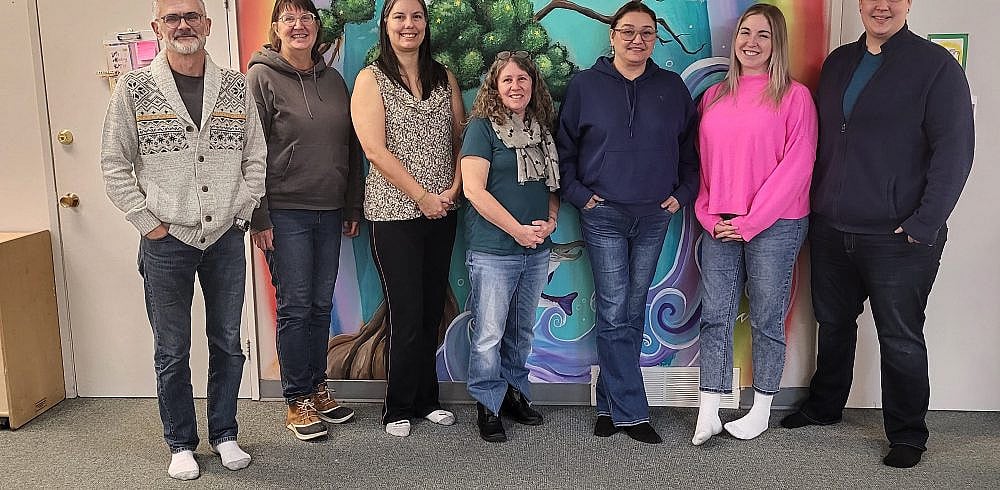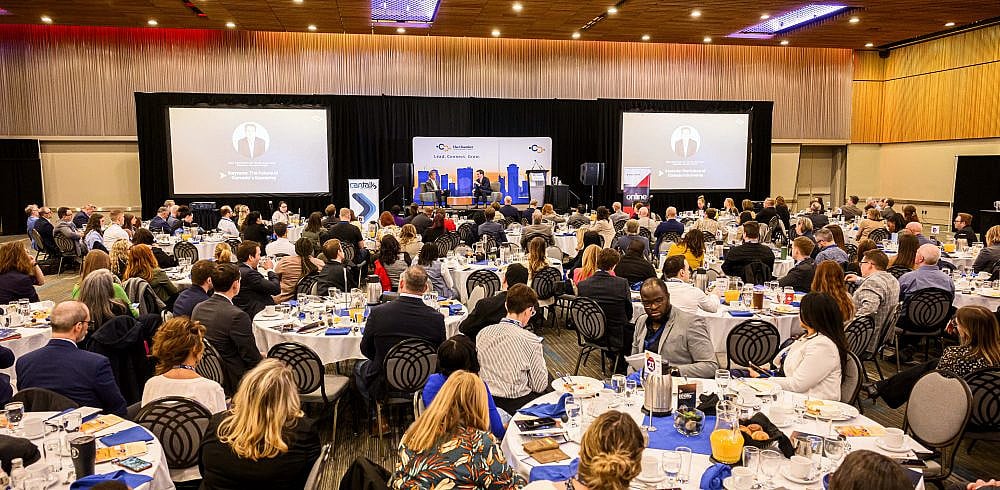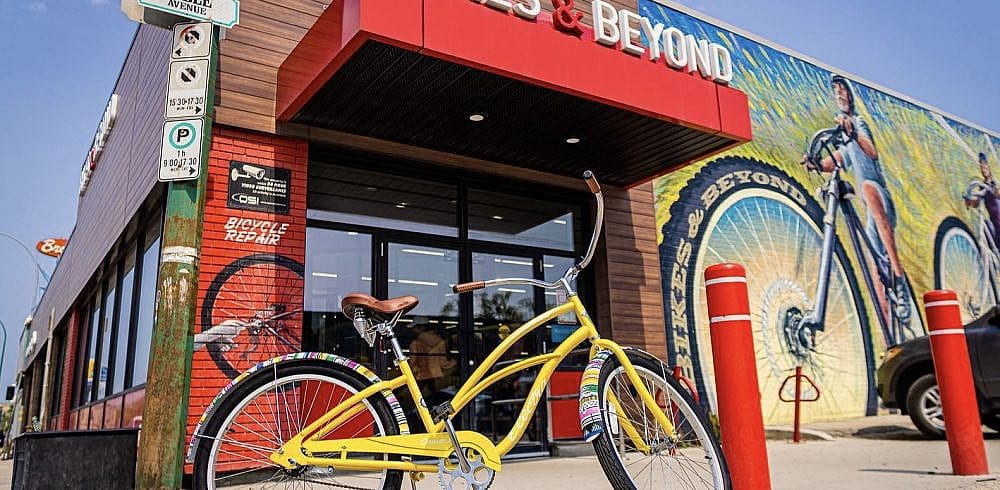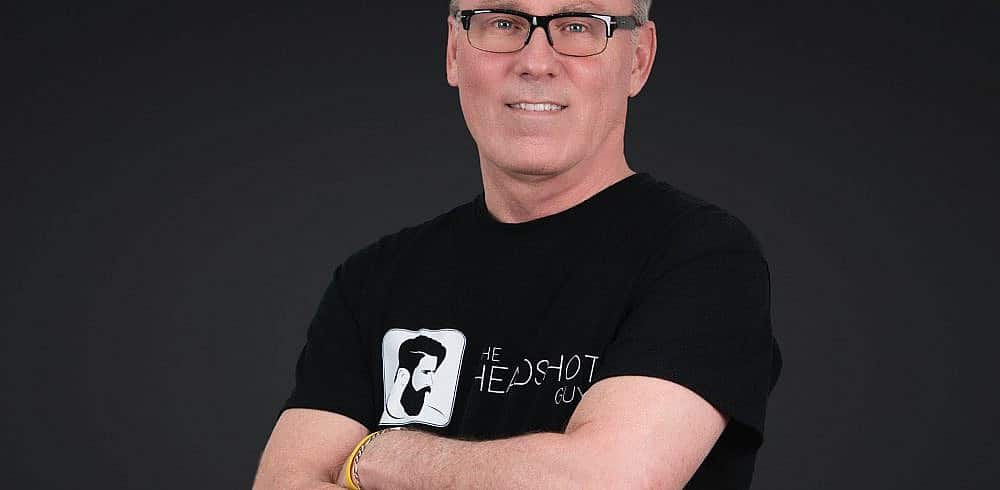6-minute read
Written by Noah Cote, Communications Manager, The Winnipeg Chamber of Commerce
June is National Indigenous History Month, a time when people across Canada celebrate and reflect on the histories, cultures and contributions of First Nations, Inuit and Métis Peoples (FNIM) throughout our communities.
Across Winnipeg, local organizations are hosting lively, accessible events to have fun and engage with our community, but also to deepen understanding through language, teaching, and in the case of one local nonprofit, talking.
Since 2017, Circles for Reconciliation (CFR) has set up talking Circles all-year-round at local venues to help participants begin building real, respectful relationships between Indigenous and non-Indigenous people.
So we sat down with CFR’s co-founders Ingrid Dowan and Grace Schedler to learn about Circles, their outcomes, and how our community can get involved.
Noah Cote: What is a Circle and how does it work?
Ingrid Dowan: Circles are made up of five Indigenous and five non-Indigenous people who meet for 90-minutes weekly, over seven weeks. Participants sit in a Circle and pass around a talking stick and whoever holds the talking stick shares their thoughts and feelings on the Circle’s topic.
The topics are based on the Seven Teachings, and each Circle is led by one Indigenous and one non-Indigenous facilitator trained by us. We’ve grown to over 200 facilitators who are all volunteers, all over the country. So people can Zoom in and participate, or join us at a local location, and you can find all that information on our website.
I can’t divulge anything from participants because the sharing Circles are sacred. I like to joke: whatever happens in Vegas, stays in Vegas.
NC: What’s your desired outcome for someone who joins a Circle?
ID: Better understanding. Take treaties for example: there’s ten people talking about land.
The outcome would be, now you understand you’re on treaty territory, and you know what it means to be on Treaty One territory, and to acknowledge that. So, we share information, and we talk about the truth, about residential schools, about the church, and what happened to our parents – my parents. Because Canada has a different legacy, right?

Pictured: A bed of flowers to honour and remember the children who lost their lives at residential schools planted by Circles for Reconciliation staff members and volunteers. The bed grows bigger each year as more children are found. Foreground: White rock with “the sacred ones” in Dakota.
People will tell us, “I didn’t know that.” Because people don’t know, and it’s not their fault – they weren’t taught in school, it wasn’t taught in my curriculum growing up like it is now.
So, understanding, but also friendship.
Most of the people who participate in Circles become friends and stay in touch. There are a couple of Circles who still go to lunch every month, then you have word of mouth from them spreading that seed like a garden, what they heard today, what they learned today, that’s the best.
You know the starfish story?
NC: No, I don’t think so?
ID: There are two people walking on a beach where starfish have washed up onto the shore. The first person is picking up the starfish and throwing them back into the ocean. The second says, “Why are you doing that, you can’t save them all.” And the first replies, “Well, I could do one at a time.”
That’s what we’re doing here. Just one at a time, and that ripples through, people, local organizations, schools, banks, everything.
NC: I want to ask about the reporting you publish on your website. In 2022, you followed 109 participants over four years to determine whether Circles work. The answer was a resounding “yes,” with the majority of participants expressing engagement far beyond the ten weeks of Circles. How does knowing what you’re doing is working make you feel?
ID: It makes me feel good to know that people are going to these Circles because they want to be in them. Lots of people come back to participate in different Circles to explore new subjects, just last week we had a Circle with the Islamic community, we’ve had Circles on climate change, and these are really well received.
NC: From looking at your events calendar on your website, I see a lot of local organizations like Gas Station Arts Centre and Seven Oaks School Division hosting Circles. What significance does the business community’s participation in Circles hold for you?
ID: A couple things.
First, it’s Call to Action 92, the equality of hiring more First Nations, Inuit and Métis people. There’s a huge pool for your HR managers to access. But here’s the thing. They don’t teach how to speak to Indigenous people in university, or marketing 101.
Grace Schedler: We interview differently, especially when we live in our communities, and then we come to Winnipeg, and let’s say I have a job interview. The questions you ask have to be different, because your European mind is interviewing my First Nations mind, we come from a different language and culture altogether. We don’t boast about ourselves, it’s hard, like selling your soul. So, you may have the best employee sitting in front of you, but because they interview badly, you’ll never hire them.
On the other hand, you could hire someone who knows how to talk and they could be the biggest asshole in your organization.
ALL: [Laughs]
ID: We speak the truth here, I love it.
You have to have the experience, and the knowledge, and the teaching. For example, a lot of people don’t recognize that June 21 is National Indigenous Peoples’ Day. We’re told our report for a grant is due that day. And I always have to say, “that’s not possible,” and I tell them why, and they apologize and offer the week after.
For businesses and organizations with physical locations here in Winnipeg, you benefit by understanding. Like understanding and acknowledging you’re on Treaty One Territory. That’s going to attract more of our people – you know how they say software is user friendly? Well, this acknowledgement is user friendly to us, because we’re so used to that systemic racism.
So making people more comfortable in your business on their land. Even in designs, logos, or your website, just having a land acknowledgement shows you’re willing to be a partner, and that’s the keyword, is partnership, partnership, partnership.
We have to work together, otherwise, it’s not going to work.
How can organizations better support Indigenous staff and stakeholders, especially when it comes to more difficult discussions or sensitive topics?
ID: From an HR perspective, awareness. There are 630 tribes across Canada, so being aware of the traditions and cultures of even just the different tribes in Manitoba.
In today’s HR practices, when an employee’s family member passes away, you get three days for bereavement leave, and then get over it.
Are you kidding me? How could you expect anybody to do that?
When someone passes away, many of our people have to fly up north, spend a few days, then fly home. You’ve just been through something horrible, and all you have is three days. And what if you’re raised by someone else, like your auntie or your family friend? If it’s not a direct line, H.R. doesn’t allow it, but you need to go.
So revisiting your H.R. policies to make sure you’re treating employees and their traditions with respect. And that goes for everyone, right? If you’re a Muslim observing Ramadan, there needs to be consideration there, it’s a whole Circle – no pun intended.
It’s on all of us to be part of this bigger community, like at The Winnipeg Chamber of Commerce, right? I always have fun when I come to your events because when I go, I feel comfortable. There’s diversity and inclusion.
Companies have to realize if you’re going to do something, do it together. Close down for the day, come to National Indigenous Peoples’ Day and enjoy, participate, volunteer.
NC: You spoke a bit about your experience with The Chamber, can you tell me about being a Chamber member and what it means to you?
ID: I always find support in The Winnipeg Chamber of Commerce whenever I ask for help. If we need some kind of direction or help from a retailer, caterer or anything, someone’s there, and we’re always trading information with other members. Always, always.
You share our events, we come to yours and there’s always someone there to greet us, like Anne [Anne Bakuska, Director of Business Development, The Winnipeg Chamber of Commerce] will come searching for us because I gave her a button the very first time I met her. Once we’re at the table, we’re a little family and we’re all good to each other and always laughing.
What’s next for Circles, and how can our members support your mission?
ID: I have a call to action for our community.
On January 16th, 2025 CFR received two emails within 1.25 minutes of each other, indicating our project was not selected for continuous support funding. The total of these two grants were one million dollars for three years of core and growth funding. Our organization was shocked as we were patiently waiting most of the 2024 year to hear back from these partners. Then this sad news came our way.
This unexpected and devastating turn of events has created a temporary cash flow crunch for our operations as we await the outcome of pending grant applications. Word is expected sometime in July, 2025. It’s been necessary to lay-off a Circle Coordinator and cut-back hours for another.
The good news for everyone is that we are continuing to plan for our biggest annual event, our National Indigenous Peoples’ Day Community Barbecue on June 20!
So we ask members to donate what they can, $10, $20, or more, anything helps. We also ask you to join us on June 20 for our barbecue and celebration.
And then just come to a Circle. 90 minutes, once a week. I see you guys going to Jets games, and Bomber games, you’ve got season tickets, but you don’t have time for reconciliation! [laughs]
But that’s really and truly how the business community can help us navigate this, is just engage in reconciliation. It will help make your mind, your heart and your business better.
So you can find more details on how to donate, come to our barbecue, or join a Circle on our website.
***
To learn more, support Circles for Reconciliation, or participate in a Circle, visit CFR’s website.




